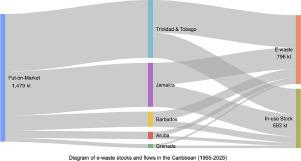Resources, Conservation and Recycling ( IF 11.2 ) Pub Date : 2020-08-23 , DOI: 10.1016/j.resconrec.2020.105106 Elham Mohammadi , Simron Jit Singh , Komal Habib

|
Islands are bounded systems, often plagued with several sustainability challenges of limited land and resource availability, as well as pressing waste management issues. Despite these known problems, research aiming to help develop proper e-waste management systems for small island nations is scarce. Focusing on five Caribbean island states, this study provides the first comprehensive view of e-waste generation trends in an island context and explores the factors driving those trends. The study estimates Electrical and Electronic Equipment (EEE) flows for the five island cases over a period of 60 years (1965–2025), including e-waste that these flows have and will generate. A dynamic material flow analysis (MFA) approach has been used to estimate these flows and stocks for 206 product types. The results show that the five Caribbean islands produced double the e-waste per capita per year, i.e., 13 kg/cap/year compared to global average of 6.1 kg/cap/year in 2016. The aggregated amount of e-waste generated per year on these five islands seems to significantly rise in future: from 27,500 tonnes in 2010 to an estimated amount of 59,000 tonnes in 2025. This considerable estimated e-waste generation rate, when not properly managed, is not only harmful for the local environment, but also translates into considerable health impacts and loss of valuable resources. From a sustainability perspective, small islands should consider moving away from a linear to a circular economy that will limit waste generation as well as reliance on the supply of virgin materials from outside.
中文翻译:

加勒比地区的电子废弃物:即将发生的环境灾难还是循环经济的机遇?
岛屿是有边界的系统,通常会受到土地和资源有限以及废物管理紧迫等可持续性挑战的困扰。尽管存在这些已知问题,但仍缺乏旨在帮助为小岛国开发适当的电子废物管理系统的研究。这项研究针对五个加勒比岛国,提供了关于海岛环境中电子废物产生趋势的第一张综合视图,并探讨了推动这些趋势的因素。该研究估计了60年期间(1965年至2025年)五个岛屿案例的电气和电子设备(EEE)流量,包括这些流量已经产生并将产生的电子废物。动态物料流分析(MFA)方法已用于估算206种产品类型的这些流量和库存。结果表明,五个加勒比岛屿人均每年产生的电子废物翻了一番,即每人每年13千克,而2016年全球平均水平为每千克6.1千克。这五个岛屿上的电子垃圾产生量的未来一年似乎将大大增加:从2010年的27,500吨增加到2025年的估计数量59,000吨。如果管理不当,这种可观的电子垃圾产生率不仅对当地环境有害,而且还会转化为对健康的重大影响和宝贵资源的损失。从可持续性的角度来看,小岛应该考虑从线性经济转向循环经济,这将限制废物的产生以及对外部原始材料的依赖。13公斤/年/年,而2016年全球平均为6.1公斤/年。这五个岛屿上每年产生的电子废物总量似乎在未来显着增加:从2010年的27,500吨增加到估计数量到2025年将达到59,000吨。估计的这种电子废物产生率如果管理不当,不仅对当地环境有害,而且还会对健康产生重大影响,并浪费宝贵的资源。从可持续性的角度来看,小岛应该考虑从线性经济转向循环经济,这将限制废物的产生以及对外部原始材料的依赖。13公斤/年/年,而2016年全球平均为6.1公斤/年。这五个岛屿上每年产生的电子废物总量似乎在未来显着增加:从2010年的27,500吨增加到估计数量到2025年将达到59,000吨。估计的这种电子废物产生率如果管理不当,不仅对当地环境有害,而且还会对健康产生重大影响,并浪费宝贵的资源。从可持续性的角度来看,小岛应该考虑从线性经济转向循环经济,这将限制废物的产生以及对外部原始材料的依赖。2010年为500吨,到2025年估计为59,000吨。如果管理不当,这种可观的电子废物产生率不仅对当地环境有害,而且还对健康产生重大影响,并浪费宝贵的资源。从可持续性的角度来看,小岛应该考虑从线性经济转向循环经济,这将限制废物的产生以及对外部原始材料的依赖。2010年为500吨,到2025年估计为59,000吨。如果管理不当,这种可观的电子废物产生率不仅对当地环境有害,而且还对健康产生重大影响,并浪费宝贵的资源。从可持续性的角度来看,小岛应该考虑从线性经济转向循环经济,这将限制废物的产生以及对外部原始材料的依赖。











































 京公网安备 11010802027423号
京公网安备 11010802027423号